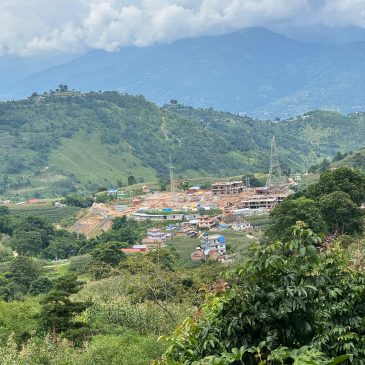Indigenous Tamang and local communities of Bojheni in Shankharapur municipality in the northeast of Kathmandu filed a complaint today with the Compliance Review Panel (CRP) of the Asian Development Bank’s (ADB) Accountability Mechanism. In the complaint, they have requested the CRP to ensure ADB’s Safeguards policy and procedural compliance in relation to their demands of relocation of the Tamakoshi–Kathmandu 220/400 kV Transmission Line and its substation in Bojheni being forcefully constructed on their lands.
The transmission line is being built as the part of the Electricity Transmission Expansion and Supply Improvement Project and the substation under the Power Transmission and Distribution Efficiency Enhancement Project under the ADB project. Both the projects are being implemented by Nepal Electricity Authority (NEA), the State owned sole utility provider in Nepal. The Transmission Line and substation in Bojheni will also be connected to the substation further south in Kathmandu in Changu Narayan through a 132 kV transmission line under the ADB-funded projects. Further, it will be extended through another high voltage transmission line to a substation to the west in Ratmate in Nuwakot district, which is planned under the US funded Millennium Challenge Corporation (MCC). The communities are thus concerned that there will be a web of transmission lines on their lands.
As per the complaint submitted by the communities organized under the Upper Tamakoshi Hydropower Project Affected Struggle Committee, the substation and the transmission towers/lines in Bojheni are being built in the middle of a settlement with the lines running over their houses, lands and religious and cultural sites. That will significantly affect or harm the communities’ livelihoods dependent on agriculture and tourism as well as the wider environment, and even cause insecurity to their health and lives, which will eventually displace them from their ancestral lands and settlement. Despite their repeated submission of complaints to the concerned authorities, including the NEA, and their continued engagement with the ADB and the NEA, their demands remain unaddressed.
On the contrary, the NEA forcibly proceeded with the construction of the substation and the transmission towers/lines with the use of heavy police forces while maintaining that the substation cannot be relocated and the transmission lines cannot be realigned. The communities’ members, including women and elderly, have been severely beaten by the personnel of the Armed Police Force (APF) that have constructed camps for the construction of the project. When the communities protested the project works using police forces, many members were arrested and some of them are still facing false charges. The ADB has failed to push the NEA to stop the use of police forces even despite the repeated meetings of the communities with the ADB representatives while the ongoing construction works have already led to landfalls that have impacted their lands and houses, filling up of a sacred pond as well as change in flow of a local sacred stream that have caused inundation of their farmlands.
In the complaint, the communities have claimed that the NEA has failed to obtain the Free, Prior and Informed Consent of the communities for the construction of the substation and the transmission towers/lines in breach of international human rights obligations of Nepal under the International Labour Organization (ILO) Convention 169 and the UN Declaration on the Rights of Indigenous Peoples (UNDRIP) and the fundamental rights guaranteed in its own constitution as well as the ADB’s Safeguard Policy Statement 2009 applicable to the projects. They have thus urged that the compliance review function focuses on ensuring policy and procedural compliance in relation to their demands of relocation of the substation and the transmission towers/lines, including to recommend remedial changes in the scope or implementation of the projects.
Further, while the compliance review is undertaken, they have called on the ADB and the CRP to get the NEA to stop retaliations against the affected community members, including withdrawal of the false charges against some of them, and cease use of the police forces, including removal of the APF camps from their community, to forcibly proceed with the construction. For that, they have demanded that the ADB suspend its financing for the projects at least until the compliance review is completed and their grievances are resolved.
The complaint follows an earlier complaint of the communities to the Office of the Special Project Facilitator (OSPF) submitted on 4 February 2025. While the OSPF is undertaking its review and assessment of the complaint, the efforts with the OSPF’s problem-solving process have not been successful and the core demands of the communities related to the relocation of the substation and the transmission towers/lines remain unresolved.
